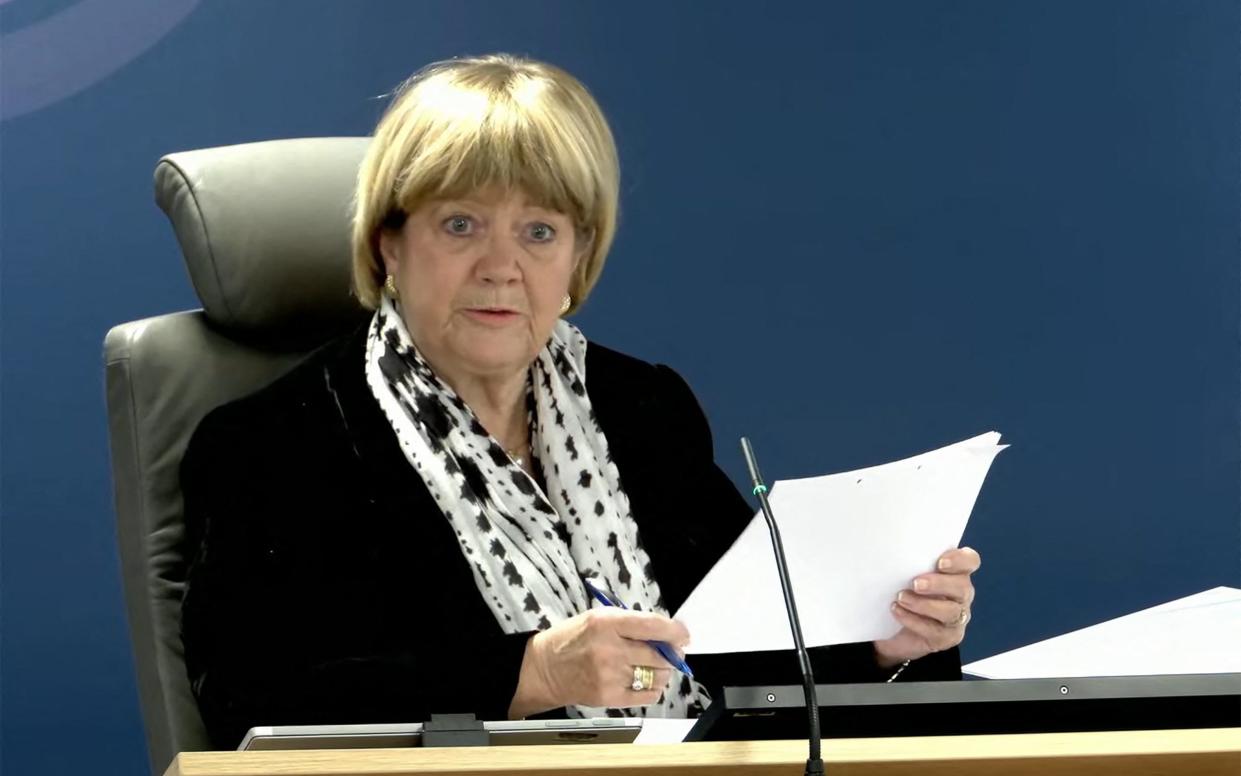Covid Inquiry appears fundamentally biased, say scientists

The Covid Inquiry appears to be “fundamentally biased” and is failing to examine the costs of lockdown, leading scientists have warned.
In a letter to Baroness Hallett, the inquiry chairman, the group of 55 professors and academics express their concerns that the process is “not living up to its mission” to evaluate the mistakes made during the pandemic, assess whether Covid measures were appropriate, and to prepare the country for the next pandemic.
They warn that a “lack of neutrality” means the inquiry “gives the impression of being fundamentally biased” and appears to have led to “predetermined conclusions, for example, to lockdown faster next time”.
In the letter published on Tuesday, the group states that the inquiry is neglecting to hear evidence from those who suffered from the “negative effects” of pandemic policy decisions, or scientists who disagree with choices made by the government.
As the second module of the inquiry comes to a close, they call for this to be urgently addressed and greater focus to be placed on the “economic and social cost of Covid policies to British society”.
The letter was organised by Dr Kevin Bardosh, an expert in infection medicine at Edinburgh University and Prof Sunetra Gupta, an epidemiologist at Oxford University.
Worklessness ‘worrying trend’
It comes as Richard Hughes, chairman of the Office for Budget Responsibility (OBR), warned on Tuesday that worklessness had become a “worrying trend” in the economy since the pandemic.
Mr Hughes told the Treasury select committee that the economy had been growing as a result of net migration but now the economy was suffering from a reversal in its workforce amid “rising levels of inactivity and a falling participation rate”.
He said: “It looks as though persistently high levels of inactivity seem to be a feature of the post-pandemic environment and one which is worrying from the point of view of human welfare.”
So far the Covid Inquiry has examined the Government’s resilience and preparedness, as well as decision making and political governance across the UK.
The next set of inquiry modules include one on the Government’s business and financial response, and another focussing on education, children and young people. Academics hope the cost of lockdown policies will be scrutinised more closely in these upcoming sections of the inquiry.
The group includes academics from York, Durham, Bristol and Exeter universities as well as Imperial College London and King’s College London, in fields ranging from global health policy and medicine to ethics, law and statistics.
Dr Bardosh, who is director of Collateral Global, a British think-tank which was set up to examine pandemic policies, told the Telegraph ahead of the publication of the letter that he wanted to write to Lady Hallett before the list of “core participants” is drawn up for the next set of modules.
While anyone can submit evidence to the inquiry, “core participant” groups enjoy special status, including the right to representation and the ability to make legal submissions, suggest questions for witnesses and receive disclosure of documentation.
‘Time to recognise their biases’
“The letter is an attempt to get the inquiry to recognise that they have got some things wrong, they still have time to redirect it to be more impartial,” Dr Bardosh said.
“It is really important that the inquiry recognises they have had these biases and shortcomings in Modules One and Two so they don’t carry it over into the other modules.”
Previously, MPs have written to Lady Hallett to urge caution about the direction of the inquiry. But this is the first time that a group of eminent academics have raised concerns.
The letter goes on to say that the inquiry is taking “key assumptions for granted instead of examining and critiquing them”.
It states: “The consensus position in pre-2020 pandemic plans was that non-pharmaceutical interventions, including lockdown, had weak evidence of effectiveness, and were predicted to cause substantial harm to society, especially if used for prolonged periods.
“This informed the initial response to Covid in early 2020. Yet, the Inquiry assumes that these measures are effective and appropriate. As a result, it downplays the harms to society caused by two years of emergency infection control mandates.”
The academics also note that the inquiry “lacks impartiality” in the selection and questioning of expert witnesses.
“It has given preferential treatment to scientific advisers on Sage, who have a vested interest in maintaining the justification for their policy recommendations,” they say.
‘Confrontational rather than inquisitorial’
“Very few scientists with an alternative position have been asked to testify, and the Inquiry has been confrontational rather than inquisitorial in its questioning of these views.
“The Inquiry has not seriously questioned the hypotheses and assumptions offered to government, especially from government appointed modellers, which were used to justify Covid policies. Neither has it seriously examined the social and economic costs of lockdown.”
Sage is the Government’s Scientific Advisory Group for Emergencies.
A spokesman for the inquiry said: “The Inquiry was established in June 2022 and is entirely independent. Lady Hallett, chairman of the Inquiry, has said repeatedly that she will not reach any conclusions until she has considered all of the evidence; that includes the written evidence.
“The Inquiry does not act on assumptions and has called expert witnesses who question the use of lockdowns and other interventions, as well as experts who advised on the imposition of lockdowns.
“The Inquiry will consider important issues such as the impact of lockdowns, key scientific and policy questions as well as population health and wellbeing in forthcoming modules. Our modular approach is clearly set out on our website and we will report during the lifespan of the Inquiry, with the first report scheduled for this summer.”


